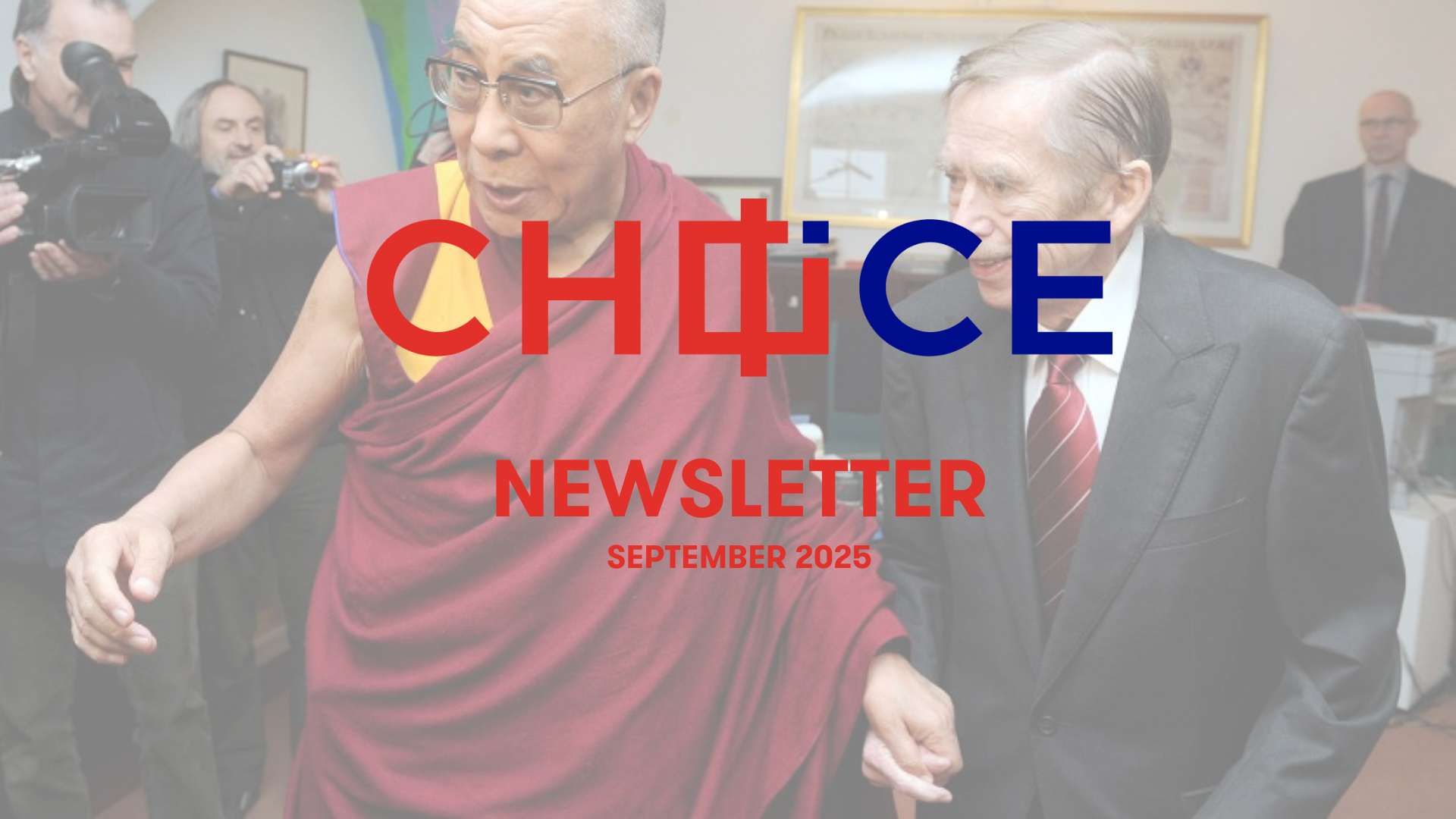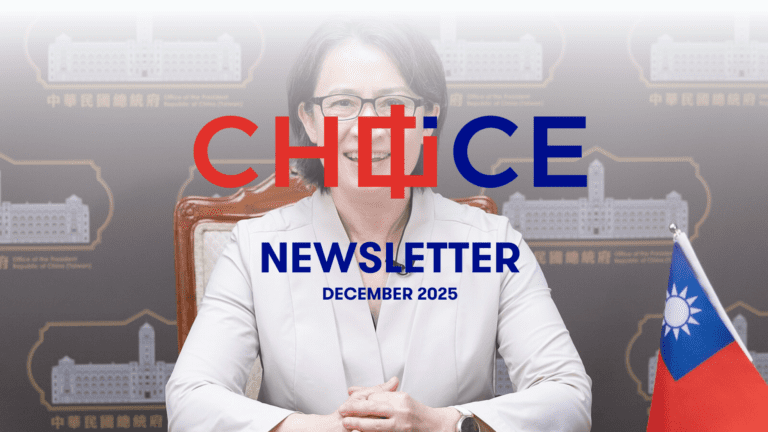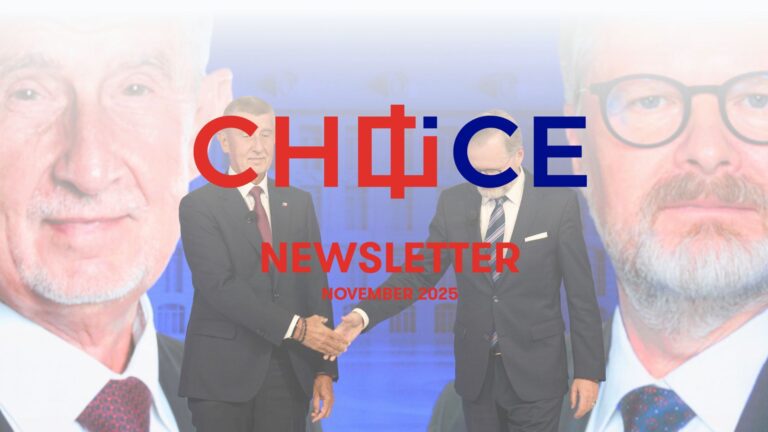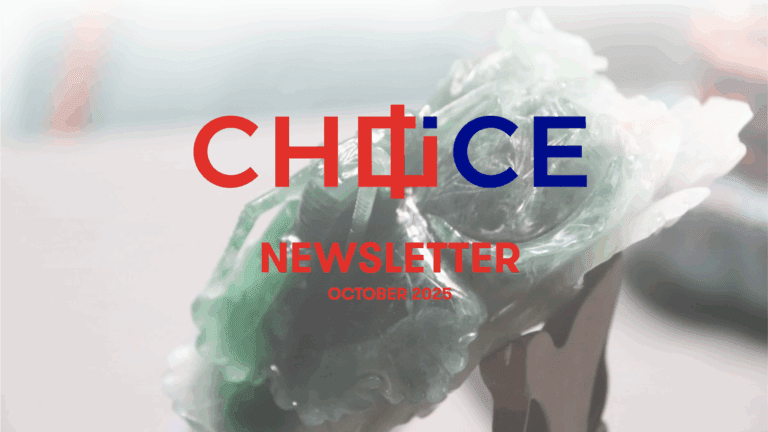CHOICE Newsletter: Czech Sympathies for Tibet Face an Assertive China

Dear reader,
welcome to the September issue of the CHOICE monthly newsletter. As we head into a busy season of briefings, publications, and conferences, we’re glad to share a milestone: our community now includes over 220 China analysts – a testament to the quality and energy of our network. Thank you to our analysts, readers, and supporters for helping us grow and for keeping CHOICE the go-to hub for CEE China expertise!
Team news to share as well. We bid farewell to Michael Douša, our Project Manager who has done a stellar job building processes, steering deliverables, and keeping partnerships on track. Michael is stepping away to complete his law degree and begin a legal career – thank you, Michael, for everything you’ve built. We also welcome Jan Blinka back to AMO after serving as Head of Caritas Czech Republic’s foreign branch in Georgia and as Director of a palliative care center; Jan will oversee project implementation and coordination. And we’re delighted to introduce Paulína Ovečková, our new Communications Manager and China Analyst – she previously interned with AMO’s China team – focusing on China’s foreign policy, economic statecraft, media influence, and China’s engagement with the Global South. It’s a pleasure to have both Jan and Paulína back in the AMO family – proof that the best colleagues have a way of coming home.
In this issue’s CHOICE Take, we examine the Czech President Petr Pavel’s meeting with the Dalai Lama – why it sparked a sharp reaction from Beijing, what to expect next, and why this moment matters for European debates on values and engagement. Our Taiwan column looks at the political and energy security challenges surrounding Taiwan’s stalled nuclear power debate.
Thank you for reading and for your continued engagement. If you’d like to collaborate or compare notes, we’re one email away – let’s make this a productive September together.
By Ivana Karásková, CHOICE Founder and Lead
CHOICE Take
From Havel to Pavel: Czech Sympathies for Tibet Face an Assertive China
When I moved from Slovakia to the Czech city of Brno for university in the late 2010s, I experienced little culture shock. Slovaks and Czechs share history, a language continuum, and a similar post-communist experience. But one thing stood out for me: the Tibetan flags hanging from apartment windows. I later learned that the widespread public support for Tibet is rooted in parallels between Tibet’s plight and local historical experience with Soviet domination, as well as Czechia’s first – and most beloved – president, Václav Havel, and his friendship with the Dalai Lama. This summer, the Tibetan cause returned to the spotlight when Czech President Petr Pavel privately traveled to meet the Dalai Lama on his 90th birthday.
Meeting the Dalai Lama was once common for foreign leaders. The list includes Angela Merkel (2007), Nicolas Sarkozy (2008), David Cameron (2012), as well as US presidents Bill Clinton, George H.W. Bush, and Barack Obama. Czechia is no outlier in the CEE region either: the Dalai Lama visited each of the Baltic states, met Polish leaders Lech Walesa and Donald Tusk, and Slovak president Andrej Kiska (2016).
But these encounters have become increasingly rare. Since 2016, the Dalai Lama has not met with any sitting EU head of state. It seems that China’s growing economic and geopolitical leverage has made most leaders tread carefully around the Tibetan cause. For instance, Emmanuel Macron openly rejected the idea of a meeting, fearing it might “spark a crisis” with Beijing. That concern is well-founded: China always responds with anger to such meetings, though the severity and tone of its reaction depend on timing, the leader involved, and of course, Beijing’s domestic political climate.
In Pavel’s case, China opted for a harsh public response that made headlines but had little real impact on bilateral relations – cutting contact with the Czech president. Several factors likely overlap here: punishing Prague is far less risky for Beijing than punishing Berlin or Washington. Moreover, according to the president’s spokesperson, Pavel had not previously been in contact with China, meaning China did not have a real communications channel to lose. Beijing could therefore gain international attention at little costs – i.e., from the harsh announcement. This setup made the case a perfect opportunity for China to send an intimidating signal meant to deter other foreign leaders with more at stake from similar pro-Tibetan gestures. The meeting’s timing – during the Dalai Lama’s symbolic 90th birthday year – added visibility. Domestically, Xi Jinping’s second official visit to Tibet later this August further heightened Beijing’s sensitivities.
Czechia’s own foreign policy context matters too: the current government has cooled toward China economically and politically while maintaining robust informal ties with Taiwan. This might change in the coming months, as the country heads into parliamentary elections in early October. Polls suggest a likely victory for the populist party ANO, led by a businessman whose foreign policy leans toward economic pragmatism. With a pragmatic government alongside a values-driven president, the balance in foreign policy will be delicate. Earlier this year, in a meeting with Czech Foreign Minister Jan Lipavský, Wang Yi remarked that cooperation between the two countries could be mutually beneficial, and a new Czech government might receive an even warmer invitation to advance the talks.
The Czech pre-election atmosphere reflects a broader EU challenge. Member states diverge sharply in their approaches to China – some emphasize values-based diplomacy, while others prioritize economic opportunities. The debate over how far Europe should go in defending democratic principles abroad is not going away, and domestic politics often shape where individual governments fall on this spectrum. Currently, an attentive flâneur in Czechia will notice that Ukrainian flags have largely replaced Tibetan ones in apartment windows, suggesting that popular support for values-based foreign policy remains strong and is adapting to new geopolitical realities.
By Paulína Ovečková, CHOICE Analyst (based in Czechia)
Taiwan in Focus
Taiwan’s Nuclear Deadlock
On August 23, Taiwanese were asked in a referendum whether the nation’s third nuclear power plant should be restarted. The result was inconclusive: a majority voted in favor of restarting operations, yet the turnout was too low for the referendum to be considered valid. Taiwan is therefore left without a clear political answer.
This uncertainty is concerning on two main accounts. The first is energy security. Nuclear power, which supplied more than 50% of Taiwan’s electricity in the 1980s, accounted for just 4% in 2024. Green energy – mostly solar and wind – now makes up about 10%. As a result, Taiwan remains heavily dependent on imported fossil fuels, most of which arrive via the Taiwan Strait. In the event of a blockade by China – an increasingly likely scenario – the island would have only eight days of energy reserves at its disposal. Compounding the issue, Taiwan’s semiconductor industry currently consumes 8% of the energy used in Taiwan, a figure projected to rise to 24% by 2030s. Energy security, in other words, is also a matter affecting Taiwan’s “silicon shield.”
The second issue concerned domestic politics. The referendum was a challenge to the ruling Democratic Progressive Party (DPP), which emerged from an environmentalist, anti-nuclear movement. Although voter turnout was insufficient to validate the referendum, the party cannot ignore the message that one of its core policies is opposed by a significant segment of the population. This setback comes just a month after the DPP’s failed attempt to use the recall mechanism to break the current parliamentary deadlock. The opposition Kuomintang (KMT), allied with a smaller Taiwan People’s Party (TPP), continues to block reforms pushed for by the DPP.
With mounting military threats from China and growing uncertainty in relations with Washington, Taiwanese society is shifting from polarization to a growing political stalemate – one that existing institutional mechanisms seem increasingly unable to resolve.
By Filip Noubel, CHOICE Analyst (based in Taipei)
WiCH Highlights
🇫🇷Agatha Kratz, our Co-Chair for France, has written a report on Chinese FDI in Europe in 2024. Check it out here!
🇭🇺Ágnes Szunomar, our Co-Chair for Hungary, was interviewed in a podcast episode on the dynamics of Chinese EV projects in Europe. Listen to the podcast here!
🇸🇪 Malin Oud, our Co-Chair for Sweden, has composed an online course on Global China and Just Transitions. Learn more here!
CHOICE News
 Our Founder and Lead Ivana Karásková spoke about FIMI with Chinese characteristics at EUvsDisinfo (watch it here). Ivana also unpacked how Labubu are connected to China’s soft power on iROZHLAS (listen here).
Our Founder and Lead Ivana Karásková spoke about FIMI with Chinese characteristics at EUvsDisinfo (watch it here). Ivana also unpacked how Labubu are connected to China’s soft power on iROZHLAS (listen here).
 Paulína Ovečková wrote an article for the Czech daily newspaper Deník N about the development of Czech–China relations (check it out).
Paulína Ovečková wrote an article for the Czech daily newspaper Deník N about the development of Czech–China relations (check it out).
 Dominika Remžová wrote an article for Hospodářské noviny about the opportunities and challenges posed by Chinese and Taiwanese investment in the V4 countries. (read it here) and commented on rare earhths dependency for Euractiv (read it here).
Dominika Remžová wrote an article for Hospodářské noviny about the opportunities and challenges posed by Chinese and Taiwanese investment in the V4 countries. (read it here) and commented on rare earhths dependency for Euractiv (read it here).
 We’re on Bluesky, LinkedIn, X, and Instagram! Stay updated with our latest articles, insights, and news by following our accounts – don’t miss out on valuable content and updates.
We’re on Bluesky, LinkedIn, X, and Instagram! Stay updated with our latest articles, insights, and news by following our accounts – don’t miss out on valuable content and updates.
Written by
CHOICE
CHOICE is a multinational consortium of experts providing informed analysis on the rising influence of the People’s Republic of China within the countries of Central and Eastern Europe (CEE).


